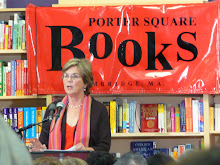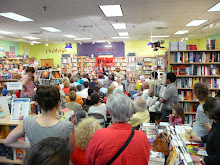This article first appeared in Signature, The Newsletter of the DC Chapter of the Women's National Book Association, and is reprinted with permission of WNBA/Washington."
"The Girl I Left Behind" by Judith Nies,
reviewed by NC Weil
Copyright 2008 Signature newsletter
Know where the phrase "bra-burner" originated? In September 1968, a group of women performance artists went to Atlantic City to stage public events mocking the Miss America Pageant. One day they paraded a sash-wearing sheep up and down the boardwalk. They planned a bonfire of Instruments of Beauty Torture in which they intended to incinerate girdles, hosiery, bras, curlers, etc., but the mayor denied them a fire permit. Ironically, though that bonfire never happened, "bra burner" has been a favorite pejorative of detractors of feminism ever since. However, a direct result of that protest was the transformation of news rooms: the guerilla theater women refused interviews with male reporters – they would only speak to women. So the newspapers scrambled, and sent copy editors and society page writers to talk to these radicals.
This was just one of the many stories Judith Nies told in July, at Politics & Prose to promote her new book THE GIRL I LEFT BEHIND: A Narrative History of the Sixties. It was a homecoming for Nies whose awakening centered on her work in Washington DC. Her personal history parallels American society's changes in a turbulent time – without styling herself a radical or even a feminist, she was nevertheless present at pivotal moments. She came of age when women were "girls", when elegance of dress and presentation were essential and "girls" were supposed to be gracious and helpful, working til they married then dropping out of sight. As a graduate student at Johns Hopkins' SAIS, she was told to use the rear entrance when Dean Acheson invited her class to dinner at the Cosmos Club (the males used the front door). SAIS classmate Madeline Albright counseled her she'd go further if she "didn't make a fuss". Ms. Nies laughed to her audience: "I guess she was right!"
It's not that she looked for trouble – in the course of doing her job she came up against absurd rules, and wouldn't let them stop her. For example, as the lone staffer for ten antiwar Congressmen, she was required to attend a hearing in the Senate, but the doorkeeper wouldn't let her in – he sent her to the Ladies' Gallery. She complained and was informed no woman was ever going to be admitted, so she documented that this violated the Senate's own rules. Later, Tip O'Neill (a fellow member of Weight Watchers), informed her the Ladies Gallery had been closed, based on her challenge.
Adventurous, resourceful and persistent, Judith Nies tells a great story. If you're fifty or older, you'll nod remembering; if you're younger, you'll be astonished – were women that restricted that recently? YES! You owe it to yourself to read this book.
Wednesday, August 26, 2009
Subscribe to:
Post Comments (Atom)






2 comments:
Great letter!
I am, as it happens, one of the readers who is older than 50, and I became very angry (again) while reading this book. It should be required reading for every young woman who proclaims (either proudly or defensively) that "I'm not a feminist." And maybe they should watch every episode of "Mad Men" while they're at it.
I'm 10 years younger than you, Judith, but when I was in graduate school in the 1980s -- a good 20 years after you were -- a professor I asked for career advice suggested that I could be a secretary after graduating. When I wanted to write a thesis on women's history, all of the (male) professors I asked to be on my committee tried to pawn me off on other professors because they wanted nothing to do with women's history.
I have a huge amount of respect for all that you accomplished in the face of overwhelming odds and discrimination. This was a fascinating book.
Post a Comment